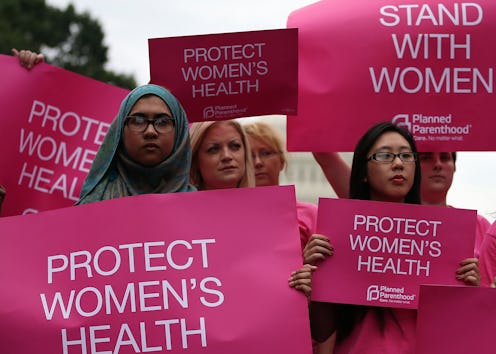News
Important Resources To Help You With Your Abortion
Abortion is one of the most commonly performed gynecological procedures in the United States, and it’s safer than a wisdom tooth extraction. So why do some people believe it's an unsafe and unhealthy practice? According to the Guttmacher Institute, half of all American pregnancies are unplanned, and four in 10 of those will end in abortion. Yet the U.S. is entering another year in which access to affordable reproductive healthcare is under fire, and it’s having a scary impact. Women should feel comfortable when making decisions about whether or not to continue a pregnancy, but their right to have an abortion is being chipped away at an alarming rate.
Let's look at some of the anti-abortion legislation that's been restricting reproductive rights:
- Over 50 clinics have closed since 2014, making abortion services increasingly difficult to access.
- Now, a third of U.S. women have to travel more than 25 miles to receive an abortion.
- There have been 231 abortion restrictions enacted since 2011.
- In the first half of 2015, state legislators introduced more than 200 bills to restrict reproductive healthcare.
- 47 anti-choice laws had been enacted by the end of 2015, including extensions of mandatory waiting periods.
- It's also extremely important to note that these restrictions do not only affect cisgender women. Trans men and gender-nonconforming people also seek abortions.
Making safe and legal abortion less accessible doesn't block the practice. Individuals seeking abortions will still terminate pregnancies, whether through methods that are much more dangerous than visiting a clinic. As the conversation and legislation surrounding abortion continue to undermine reproductive rights and healthcare, here is a roundup of resources available to you for emotional, factual, and economic support in your own abortion process.
1. Pre-Abortion Counseling
Choosing to terminate a pregnancy can be emotionally stressful. People of all races, religions, and economic backgrounds have abortions, but the stigma surrounding the procedure can cause unwanted stress in the decision-making process.
Backline offers counseling and support to people making decisions about pregnancy. From parenting to adoption to abortion, their talk line provides support for individuals looking to discuss their feelings and experiences. All people should have access to emotional support throughout the abortion process, and should not feel shame or guilt from their communities.
2. Statistics, Procedures, And Recovery: Everything You Need To know
It can be difficult to know where to look for information on abortion when you're trying to figure out your options. It's best to stay away from resources that talk about "life," as well as "pregnancy crisis centers." You should also probably stay away from more graphic pro-life imagery.
Our Bodies Ourselves is a nonprofit organization that provides accurate — and not anti-abortion — information about reproductive and sexual health. This organization seeks to empower individuals to access their reproductive health needs regardless of racial or economic disparities, ensuring that we all may have accurate information about sexual health. OBOS offers facts about the different types of abortion procedures — such as medication and surgical — and at what point during a pregnancy each procedure is available. They also provide accessible information on legal access and parental consent for teenagers.
3. Getting Economic Assistance
No one should have to carry an unwanted pregnancy to term due to a lack of financial support. Abortions can be expensive, costing up to $1,500 in the first trimester. According to a report from the Guttmacher Institute, in 2013, 50 percent of respondents who sought an abortion used outside financial assistance to pay for the procedure. The National Network of Abortion Funds helps individuals pay for reproductive services they might not be able to afford on their own. The NNAF has local funds around the country to ensure that an individual’s access to abortion services is not controlled by their economic standing.
4. Sharing Your Story In A Safe Place
The stigma associated with unwanted pregnancy and abortion can make the process very lonely. Because of the silence around the issue, it can be hard to find support from other people who have gone through a similar experience.
The Abortion Diary is a podcast founded by Melissa Madera for the purpose of “creating spaces for personal abortion storytelling.” The podcast can help people seeking abortions to find comfort from hearing about another’s experience, and also offers an outlet for individuals who have gone through the process to share their own stories. Madera is doing amazing work to counter the messages sent by a society that so harshly criticizes our right to bodily autonomy and reproductive choices.
5. After-Abortion Support
Most people report having positive feelings after an abortion, such as relief and decreased stress. However, some feel sadness, guilt, or anger. No matter how you feel after an abortion, you are not alone. Exhale is an after-abortion support talk line that provides emotional support and resources to anyone who has had an abortion.
This year, let’s keep fighting to promote access to affordable, fundamental healthcare for all people seeking abortions.
Images: Giphy (3), Guttmacher Institute (1), Urge.org (1)
